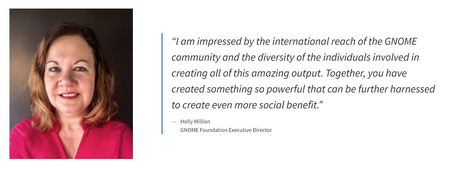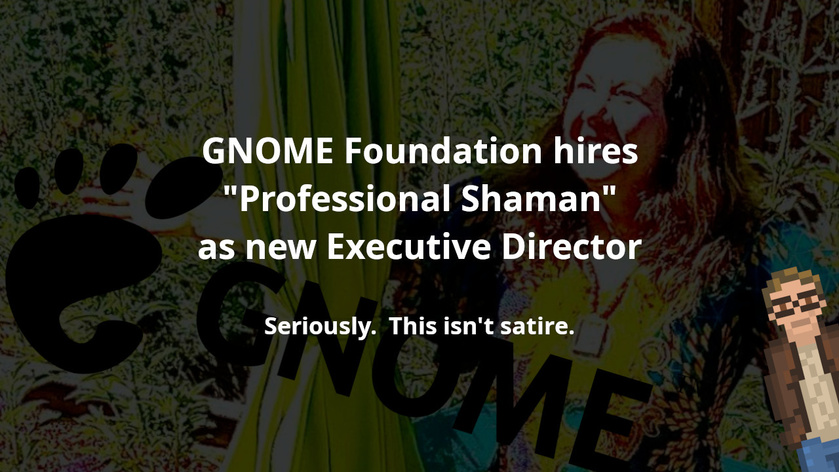Before we begin, I need to stress something: This is not satire. Not a joke. What follows, while ridiculously whimsical, is 100% real.
Just a few short hours ago, the GNOME Foundation announced that they had hired a new Executive Director to lead GNOME into the future. And her name is "Holly Million".
Oh! And, before I forget, I should note that the new GNOME Executive Director... is a "Professional Shaman".
Seriously.
There still is a great deal of information yet uncover and digist about the person who will lead largest Linux desktop environment... but here is what we know so far.
According to the GNOME press release, Holly Million is a "multi-talented individual with a diverse background in nonprofit leadership, filmmaking, teaching, public speaking, and writing."
In the announcement, this new GNOME director stated, "I am impressed by the international reach of the GNOME community and the diversity of the individuals involved in creating all of this amazing output."
 All of which set off my "This doesn't sound like a person with software experience" alarm.
All of which set off my "This doesn't sound like a person with software experience" alarm.
So I began doing searches to see what the background of Holly Millions truly was. And it was more amazing and whimsical than I could have possibly dreamed.
Holly The (Disappearing) Shaman Artist
That's when I found www.HollyTheShamanArtist.com. A website which, unfortunately, was set to "Private" in the last few days.

Thankfully both Archive.org and Google have snapshots for us to enjoy.
Here are a few snippets from the website.
"My name is Holly Million, and I am a professional shaman, an artist, an herbal medicine maker, and a micro-homesteader."
"Eight years ago, I realized the best word to describe me must be “shaman.” A shaman is a bridge between the material and spiritual worlds, between the seen and unseen worlds. I am now a professional shaman."
"I am planning to write a series of books, two of which are now works in progress."
She also appears to sell "Spiritual Herbs" and offers virtual shaman services which people can purchase via Venmo. Which, interestingly, is a sentence that makes my left eye twitch.
In addition to her now-private website, Holly Millions has also, recently, set her Instagram account to private.

Wonder what shaman-y goodness is in there. The world may never know.
Thankfully, as of this writing, she has not yet locked down her Facebook business page.

So what, exactly, is Holly Million's business that she runs on Facebook? So glad you asked!
She posts the following each week:
"Join me every Wednesday from 5 PM to 5:30 PM Pacific Time as I guide all participants through a group shamanic energy clearing. Learn about the shamanic spiritual hygiene process that I use on myself and with my clients. This is a great technique to help you keep yourself free of any interference, heavy energies, emotional burdens, and other things you really don’t need.
This clearing is FREE for all participants. Learn more about the work that I do and experience it firsthand.
If you appreciate having this weekly group, please consider making a donation to support it. Tip jar: https://venmo.com/u/Holly-Million
Find out more about my 1:1 energy work with clients, my herbal products, and my shamanic apprentice program at Hollytheshamanartist.com
Just show up on my page on Facebook or Instagram at 5 PM Pacific, and I will be there!"
Shamanic. Energy. Cleaning.

As one recent Facebook Post described her:
"The fabulous Ms. HOLLY MILLION. This woman has much to say about a world which we are sometimes challenged to access. She connects with the spirits and the unseen. Come hear Holly share her magical mystical mysteries."
I'll leave that quote there without further comment.
Not Much That Isn't Shaman-y
Her LinkedIn page is almost completely empty, showing no signs of life for many years. Likewise it does not appear that she has used Twitter since 2019. Not that using LinkedIn and Twitter are mandatory, mind you... I simply mention it as most people in the "Executive Director" line of work would tend to have at least one or the other.
In fact... I would say roughly 99% of the information relating to Holly Millions is specifically about her work as a "Professional Shaman"... and much of that appears to be in the process of being deleted or set to "private".
About the only non-Shaman-y thing I could find about Holly Million was that she runs artists-united.org. Which seems to be not much more than a simple template of a website with 4 pages on it and almost no references to it anywhere on the Internet.
Left With a Lot of Questions
After looking through just about everything I could find on Holly Millions, I have a few takeaways:
- She does not seem to have any experience with GNOME or Linux.
- In fact... she does not seem to have any experience related to software. At all. In any way.
- Her primary business appears to be focused on her work as a "shaman".
- Leading up to her announcement as the new GNOME Foundation Executive Director, she appears to be trying to erase her online history of shamanism.
- The GNOME Foundation seems to have left out her primary (Shaman) work in their press release.
All of which leaves me with some pressing questions:
- Why did the GNOME Foundation not mention their Executive Director's primary passion and work experience as a shaman? Is the GNOME Foundation ashamed of shamanism?
- What aspect of shamanism was most needed within the role of the Executive Director?
- How will shamanism be incorporated into future GNOME releases?
- Will ayahuasca be used at future GNOME conferences or during future UI design?
- How, exactly, did GNOME find Holly Million during their search for a new Executive Director?
Seriously. Those may sound like tongue-in-cheek questions... but, considering this move, I kinda want to know the answers!
A Note of Thanks to GNOME
I would also like to take this opportunity to directly thank the GNOME Foundation.
This is, without question, one of the most whimsical Tech news stories in quite a long time. And, let's be honest, we could also use a bit of whimsy in our lives.
And to Mrs. Holly Million, the new Executive Director of the GNOME Foundation: Welcome to the wonderful world of Linux! You have a standing invitation to The Lunduke Journal podcast whenever you like.
Just be prepared for most of my questions to be about the relationship between ayahuasca and GTK4.


















